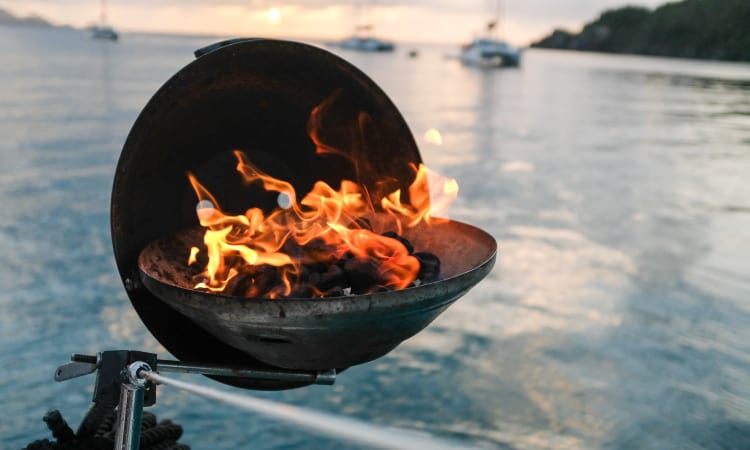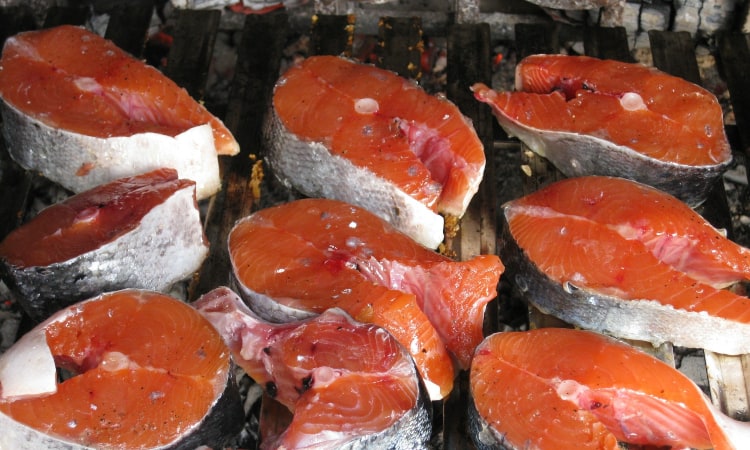
Taking your boat and heading out on the water is one of the greatest ways to spend your weekend, especially if the weather is great. But you know what also goes well with fine weather? A hot sizzling slab of meat on your grill!
But, is it legal to grill on a boat? Yes! Grilling on a boat is legal as long as you’re being safe and using the right gear for the job. To help you out, we’ve listed several grills that will get the job done!
Keep on reading if you want to know more about grilling while on your boat as well as pro tips to ensure your safety out there!
By the way, as an Amazon Associate, I earn when buying qualified products through links on my site.
Top Grill That You Can Use on a Boat
For a grill to be good for boats, it needs to have safety mounts that allow it to be securely mounted on the boat. Here are some of the most popular options when it comes to grilling on a boat:
- Camco Olympian 5500 Portable Gas Grill – best overall grill for boats
- Modified CUISINART CGG-180T Portable Propane Grill – ideal for small groups.
- Magma Marine Kettle Gas Grill – best for space efficiency and security
- George Foreman Indoor/Outdoor Electric Grill, – best electric grill for boats
- Coleman Camp Propane Grill – an excellent choice for buyers on a budget
Will Grilling on a Boat Put You in Any Legal Trouble?
Laws differ from state to state and from lake to lake. Lake Sonoma in California (source), for instance, forbids charcoal grills but allows propane grills. However, grilling on a boat is usually legal as long as you abide by any special requirements or regulations that are set by the authorities in your area.
In fact, there are multiple grill manufacturers that make and sell specific models that are specially made for use on a boat.
These specialized grills are designed to sit on mount brackets or clip onto your boat’s rail for security.
However, your concern should be more about your own safety with a burning grill on board. Securing the grill and using the right type of fuel will help you avoid any sticky situation that you might get yourself into.
If the grill isn’t secure, it might tip; causing anything from an annoying mess on deck, all the way to injuries or even causing a boat fire.
Since laws and rules are set to protect your own safety, responsible patrolling authorities might show up if you’re putting your life and others in danger.
Are There Any Laws for Catching and Grilling Fish?
Fishing and boating are like peanut butter and jelly but think of the amazing combination of being able to grill the fish caught right on the spot.

You might be concerned about any laws that prevent cooking it immediately. In general, there aren’t many laws regarding whether you can grill fish in the same vicinity of where you catch them.
However, it’s generally okay to catch and grill a fish on a boat, provided that they’re under 1.5 lbs of fillets per person on the boat.
Also, there may be some rules that prevent you from catching specific species of fish or fishing during certain seasons.
Can You Use a Charcoal Grill on a Boat?
You should never use a charcoal grill when you’re cooking on your boat.
Charcoal grills work well in normal circumstances. The food tastes great, and the grill is relatively inexpensive. However, they have a major downside when it comes to storage.
Ideally, charcoal needs to be kept dry all the time for it to fire up, which is something you can never guarantee on a boat. Plus, with the tipping and bumping around, the ash from your grill is likely to get everywhere, which can be a huge mess as well as incredibly dangerous.
As for safety, while other types of grills can be shut down easily, putting out a charcoal grill is more complicated. Charcoal remains red hot for quite some time, which can be considered a major fire hazard and can easily melt a hole in your boat.
For all these reasons, you should always rule out the charcoal option when choosing a grill for your boat.
What Kind of Grills Are Suitable for Grilling on a Boat
Knowing that charcoal grills are out of the question, you are left with propane and electric grills for use on a boat.
With the charcoal grills out of question, you might wonder which types are suitable for a boat grill. Ideally, propane and electric ones are the fuel of choice for grilling on boats. Let’s have a quick look at them.
Propane Grills
Propane grills are the golden standard for boat-friendly grills. What makes them highly suitable for the job is their portability and ease of operation.
This grill from Cuisinart is engineered for use on a pontoon boat (see on Amazon).

They also don’t require the storage space that charcoal takes and lasts for a decent time. With a secured propane grill on a boat, you won’t need to worry about accidents that can be a huge problem with charcoal.
The major downside to propane grills is safety. If the flame ever goes out (which is more likely when you’re on the open water with all the wind), then if your grill doesn’t have an auto-shutoff mechanism, then that means that the gas is going to leak into your boat area and could ignite from other ignition sources. Make sure to monitor your flame.
Electric Grills
Another alternative that can work pretty well for boat owners is the electric grill option. If your boat supports electric ports, these grills would be an excellent option to consider for a lot of reasons.
Electrics grills are relatively affordable, user-friendly, and much easier to adjust as well as packing tons of safety features. Here’s an example of a very nice electric grill on Amazon:

There are a couple of downsides to electric grills–mainly that they use a lot of power, and many people prefer cooking with gas rather than electricity. If you have the battery for it, though–it’s really a great option.
Safety Tips for Grilling on a Boat
- Test the durability of the grill before firing it up
- Never leave the grill unattended when it’s operating.
- Only grill when the boat is not moving to avoid tipping over.
- Put out the grill as soon as you’re done cooking.
- Make sure that the flames and heat of the grill are downwind from flammable objects and you.
Conclusion
So is it legal to grill on a boat? As you can see, grilling on a boat is mostly legal and will be an excellent experience as long you maintain safety standards.
However, if you’re still unsure, the safest route to take is to contact the authorities responsible for boating regulations in your state before you head out on the water.
